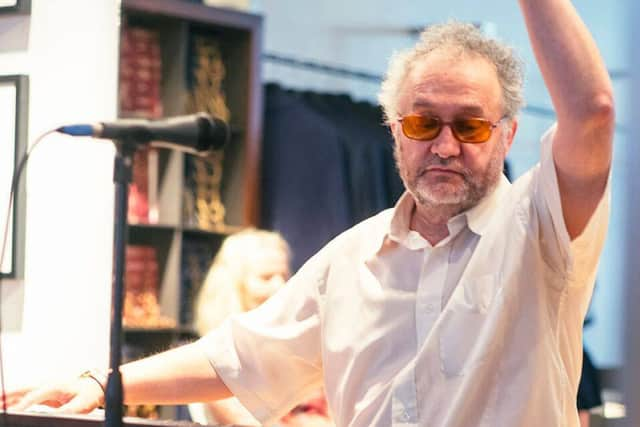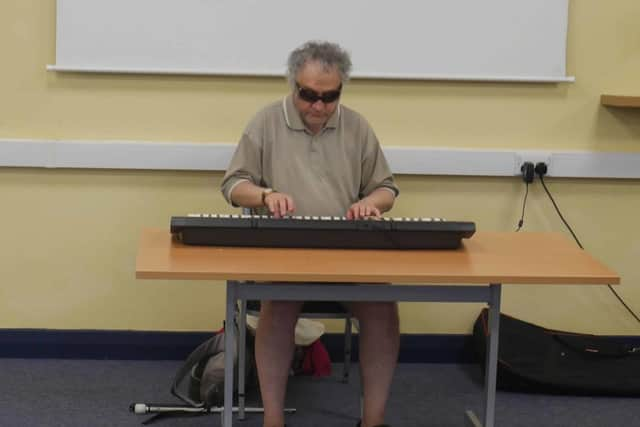Deafblind Awareness Week: Incredible pianist plays with no sight and little hearing
and live on Freeview channel 276
Elton John once said: “Music has healing powers.
“It has the ability to take people out of themselves for a few hours.”
For 66-year-old pianist and composer Mark Pampel, this sentiment rings true.
Advertisement
Hide AdAdvertisement
Hide AdMark was diagnosed with Usher syndrome, a hereditary condition characterised by impairment of vision and hearing, at 16 years old.
This has left him with no sight and very little hearing.
But this hasn’t stopped him from becoming a successful musician.


As pianist and composer of the LSO Create Orchestra, Mark has played at the Barbican Centre as well as performing solo piano works at other local concerts.
He also performs fortnightly at the Victoria and Albert Museum amongst other venues, all of which he does in a voluntary capacity.
Advertisement
Hide AdAdvertisement
Hide AdMark had previously worked as an administration officer in the civil service for 20 years but as his condition worsened he was forced to take early retirement.
That is when he turned to music.
“I enrolled in a number of piano courses which have taken me up to a professional standard,” he told LondonWorld.
“I use composing and improvising techniques to learn and create new music. I hear a piece of music and re-play it by working out which notes I hear.
“I can then improvise various parts to change the music and make arrangements of well known classical and popular music, as well as composing my own piano music.”
Mark describes how his condition developed from childhood.
Advertisement
Hide AdAdvertisement
Hide AdHe said: “At the age of eight onwards, I noticed a change in my hearing and I also started to experience night blindness.
“As a teenager I was very active, I played table tennis, I went swimming, I played in a football team for a youth club.”
His parents took him to a Harley Street clinic at 16 years old to see a specialist where they was told that by the time he reached his 50s or 60s he would be deaf and blind.
“I walked out of the clinic as though a hammer had just hit my head,” he said. “My eyesight deteriorated quicker than my hearing.
Advertisement
Hide AdAdvertisement
Hide Ad“Now unfortunately I have no useful eyesight at all and I suffer from Charles Bonnet syndrome, which gives me hallucinations.”


Mark describes how people have different coping mechanisms.
“In my circumstances I’m not the type to start drinking alcohol and smoking cigarettes,” he said.
“Music is a key factor that gets me through, it’s so important to me. It gives me the most amazing sense of wellbeing.”
Mark also keeps himself fit and healthy with various activities and hobbies.
Advertisement
Hide AdAdvertisement
Hide Ad“I practice transcendental meditation twice a day which is a simple, powerful, effective and ancient relaxation technique which also reduces stress.
“I go for a swim once a week with the Starfish Club for disabled people at a local swimming pool, and also do daily yoga postures which are very good for both my mind as well as body.
“I sit in the garden and smell the greenery and feel the sun on my face.”
Although Mark is able to hear with the assistance of powerful hearing aids, he wishes there were specialist devices for musicians to help him hear his and other pianos that he plays sound natural again.
Advertisement
Hide AdAdvertisement
Hide Ad“The beautiful Steinway grand piano I play in supporting the LSO Create Orchestra sounds alien and electric which is very difficult for me to manage and become accustomed, especially as I have still been able to retain my perfect pitch.
“This extremely important function has been lacking in all new modern hearing aids to enable musicians, especially pianists, to be able to hear the piano sounding natural.
“The audiologist informed me that most people want to hear speech far more in preference to music, so because I was in a minority the audiologists or hearing aid companies could not currently offer any solutions to meet my needs.
“This is extremely disappointing and unfair as I desperately want to continue my work in entertaining and supporting the LSO Create Orchestra to the best of my ability which is being compromised by inadequate hearing aids available today” he said
Advertisement
Hide AdAdvertisement
Hide AdMark is supported by the national charity, Deafblind UK and was invited to the Queen’s Garden Party in 2014 in recognition of his campaigning work for the deafblind community.
CEO Steve Conway said: “Mark is extremely talented and I’m astounded at what he has achieved with no sight and very little hearing.
“Deafblindness can rob you of so much, but to have the determination to follow your dreams and the confidence to perform in public like this is truly inspirational.”
Deafblind Awareness Week runs from June 27 to July 3 and the charity Deafblind UK is encouraging people to get “in the know” about deafblindness, during the week so we can all be more deafblind aware.
Comment Guidelines
National World encourages reader discussion on our stories. User feedback, insights and back-and-forth exchanges add a rich layer of context to reporting. Please review our Community Guidelines before commenting.
